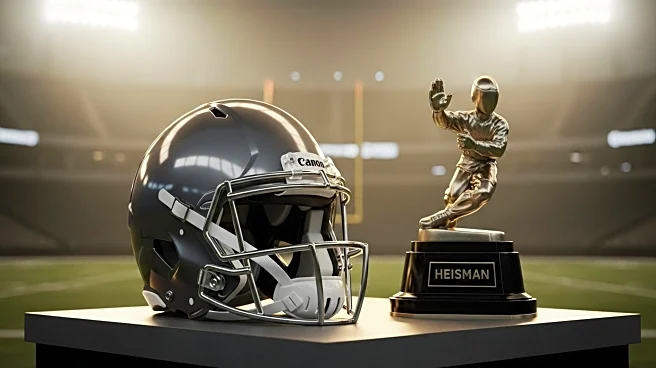What's Happening?
Robert Griffin III, a former Heisman Trophy winner and current FOX Sports analyst, has released his updated Heisman rankings, sparking debate across college football. Oregon's freshman quarterback Dante Moore tops the list after a standout performance against Penn State, where he threw for 248 yards and three touchdowns. Moore is currently fourth nationally in touchdown passes and fifth in completion percentage, positioning Oregon as a strong contender for a playoff run. Other notable mentions include Missouri's Ahmad Hardy, who leads the FBS in rushing yards and touchdowns, and Vanderbilt's Diego Pavia, who made history with six total touchdowns in a recent game. Griffin's rankings reflect the unpredictable nature of this year's Heisman race.
Why It's Important?
The Heisman Trophy is one of the most prestigious awards in college football, and Griffin's rankings provide insight into the players who are shaping the season. Dante Moore's emergence as a top contender highlights the impact of freshman talent in college sports, potentially influencing recruitment strategies and team dynamics. Ahmad Hardy's consistent performance underscores the importance of a strong rushing game, while Diego Pavia's historic achievement for Vanderbilt could boost the team's visibility and reputation. These developments may affect team strategies, fan engagement, and media coverage as the season progresses.
What's Next?
As the college football season continues, the Heisman race is expected to intensify, with players striving to maintain or improve their standings. Teams will likely adjust their strategies to maximize the performance of their Heisman contenders, potentially affecting game outcomes and playoff prospects. Media coverage and fan interest will likely increase, adding pressure on players to perform consistently. The rankings may also influence future recruitment and scholarship decisions, as schools seek to attract top talent.
Beyond the Headlines
The Heisman race not only highlights individual talent but also reflects broader trends in college football, such as the increasing impact of freshman players and the evolving strategies of teams to leverage star athletes. The race can also affect the cultural and economic aspects of college sports, influencing merchandise sales, sponsorship deals, and the overall popularity of the sport.










